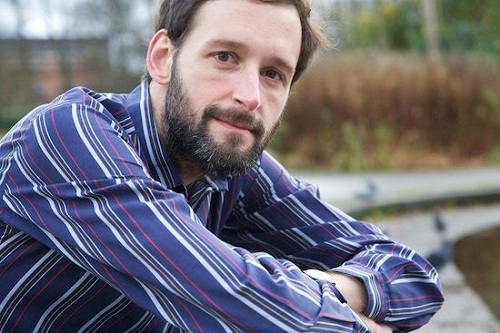London’s Foundling Museum is full of intriguing artefacts. “Some of these things you’d think only existed in folk songs. But here they are in real, palpable things,” we are told before the first of the museum’s new, monthly folk nights. What a place, then, to meet Alasdair Roberts, the Scottish singer whose most recent album A Wonder Working Stone is so concerned with social history, with the immediacy and tangibility of old things.
“There are a lot of grand old portraits here. But I’m more interested in the temporary exhibition that’s on at the moment. The tokens,” Roberts tells me as we settle down backstage after the gig. In the exhibition he’s talking about, the keepsakes given by parents to the FoundlingHospital as identifying markers for their children are matched with the documents and papers and plans that have cascaded from them as they’ve fallen through history:
“A little ring that’s broken in half can be much more fascinating than the grandest oil painting of the noblest duke. It’s the modesty of it, the softness of it, the smallness of it I suppose.”
A Wonder Working Stone is, likewise, full of small and soft moments. But it’s also full of big movements and whole nations. “As a Scottish artist I’m interested in writing about Scotland,” Roberts explains. “I feel my work is becoming more and more Scottish as I age. There’s been a tendency in certain kinds of Scottish music, in literature even, to present this romanticised view of the rural life of Scotland. In my writing I use the natural world as a source of conceits, and that to me seems a very Scottish thing.”
The album’s complex sense of Scottish identity seems timely, we suggest, as Britain approaches a crucial tipping point on Scottish independence. Was this on his mind when writing these themes into the record?
“Some of it’s kind of personal because I was at a point where I might have left Scotland. There’s some references on the album to this idea of leaving. The political aspects of the record – and there are some – aren’t really addressing Scottish nationalism or any concerns that particularly apply more to Scotland than anywhere else. The songs are more generally concerned with justice and social issues, things that happen worldwide. Conflict and things.”
Why not, we ask, have done a trad album, when these ideas are so informed by tradition?
“I do interpret traditional ballads. But it doesn’t really feel enough for me because I like creating words as well. It’s a push and pull in me between tradition and feeling the need to do something new and to write new stuff and do new things.”
When Roberts does tackle traditional material, he finds it “all over the place. Old recordings in the School of Scottish Studies.  Books. From other singers, friends of mine. Old LPs sometimes. But other times the ballads I sing will have a personal meaning. Like ‘Flower of Northumberland’ that I learnt from my father or other ballads that are in my repertoire as a person, as a musician. They’re in my head all the time.”
Books. From other singers, friends of mine. Old LPs sometimes. But other times the ballads I sing will have a personal meaning. Like ‘Flower of Northumberland’ that I learnt from my father or other ballads that are in my repertoire as a person, as a musician. They’re in my head all the time.”
Another thing rattling around in his head for a long time was the Scottish mummers play ‘Galoshins’, which he revived as a puppet show last year: “I first read about it online somewhere and bought a book about it by a guy called Brian Hayward. It had been on my mind for about four or five years to do something based around this play.”
“I’m quite interested in things to do with ritual. It’s ritualistic, kind of pagan, slightly mysterious. It’s hard to tell exactly what’s going on. A thing that can be understood without really knowing why you understand it. It makes sense in this weird cosmological way, in a very intuitive way, this kind of death or rebirth. This combat. It just seems like a very archetypal combination. This struggle between two opposing forces is manifested in this struggle between these two wee characters. These two wee puppets. It fits. I see it as a kind of sacred drama, in a way.”
Another idea pre-occupying Roberts is the “topsy-turvy or the world turned upside down. The carnivalesque.” It’s a mode whose mischievous hand arranges A Wonder Working Stone’s opening song ‘The Merry Wake’. “I’d been reading Michal Bakhtin, the Russian theorist’s study of Rabelais and thinking about that medieval conception of a period of license where the world was temporarily suspended. For me ‘Galoshins’ is part of that, it’s this kind of entering into a liminal state for a brief period.”
Bakhtin, I point out, claimed the Carnivalesque was primarily a means of preserving the status quo. “So that’s the thing about it,” concedes Alasdair, “it seems radical but it’s actually inherently conservative because order’s necessarily restored afterwards.”
“Maybe I’m just a very conservative person,” he laughs. “I suppose I just find it interesting that these sort of things go on. It’s almost a worldwide phenomenon, this idea of carnival, of order being upturned and then reappearing again. You can apply it to lots of different situations. ‘The Merry Wake’ is a song of marvels or impossibilities or things being slightly askew. There’s lots of traditional songs about things like that, like ‘NottamunTown’, or ‘McGinty’s Meal and Ale’ where a pig goes on a rampage in a stately home. That’s a moment of order being suspended, a moment of chaos.”
Coming up, Roberts is working on a collaboration with Amble Skuse and the pianist David McGuiness, which could get them in the studio early next year. And he’s writing. A lot. “I write pretty much all the time,” he admits. “All I’ve had to say for the last couple of years is on that record. So it’s like I have to figure out what the hell to say next, develop a new series of pre-occupations to write about. Find new things. Explore. Go out into the world a bit more and discover new things to be inspired by.”
words: Tom Moyser
Live dates (more on website):
May 2nd – Teviot Hall, Edinburgh
May 3rd – Stereo, Glasgow
May 9th – Tunnels, Aberdeen
May 14th – Barbican, London
May 29th – The Pleasance Cabaret Bar, Edinburgh
May 31st – The Goose Is Out at DHFC
June 15th – The Ceilidh Place, Ullapool
August 13th – The Star Folk Club, Glasgow

